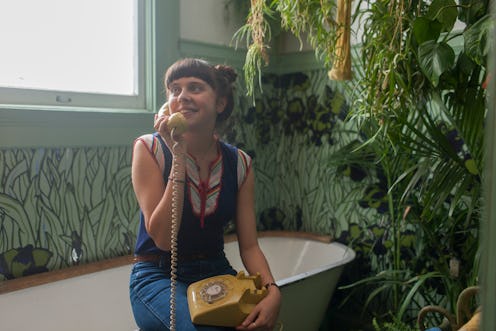Entertainment
On 'Diary Of A Teenage Girl's Much-Needed Feminism

Earlier this year, Variety posted a Sundance-themed interview with the presidents of Sony Pictures Classics, Tom Bernard and Michael Barker, about the wealth of woman-made and female-oriented films making the festival circuit this year. One such film, which their distribution company fought hard for and eventually obtained, is the upcoming bildungsroman The Diary of a Teenage Girl, directed by Marielle Heller and starring Bel Powley, Alexander Skarsgard, and Kristen Wiig. In the interview, Bernard and Barker chalked up the flurry of excitement around The Diary of a Teenage Girl and its feminism to leading a sort of Moment for women in film.
“It's the year of the woman," Bernard told Variety. But contrary to their reasoning, The Diary of a Teenage Girl isn't an indicator of a trend — rather, it's an unexpected, though necessary and welcome, aberration in the Hollywood status quo, where female directors and female voices are more often than not denied the platform to make films like this. Films like Diary — by and about women, though they should appeal to a universal audience — do appear on occasion (think last year's Leigh Janiak-directed, Rose Leslie-starring film Honeymoon, or Jennifer Kent's The Babadook, also starring Essie Davis), but they're the exception, rather than the rule.
It would be an incredible (in both the literal, "not to be believed" sense and the "amazing/awesome" sense) feat if The Diary of a Teenage Girl truly shifted the tide in filmmaking the way Barker and Bernard seem to believe it will. But at the very least, it should absolutely be taken as a model for what film can do for its female characters — not only because it passes the Bechdel test (though it does, quite well), but because even when it doesn't, the conversations young women have about young men say as much about the female characters and their insecurities as they do about their relationships to the opposite sex. Every part of the film isn't feminist, but that doesn't make it an un-feminist film.
Take, for example, a scene in which Minnie's (Bel Powley) mother, Charlotte (Kristen Wiig), dishes out some unsolicited fashion advice to her daughter. "You know, you're not going to have that bod forever, Min," Charlotte says. "I know that's not very 'feminist' of me to say, but you might be happier if you put it out there a little bit."
Charlotte believes that makeup and a skirt in place of Minnie's fresh face and hallmark tee shirts might earn her the attention of her male peers, and while it's clearly played for the audience's amusement, it's not meant as a moral lesson. Whose mother hasn't made a misstep like this? The movie is wholly un-judgmental, and it deserves all the more credit because of it. It eschews moralizing in favor of simply showing real, honest conversations between women, especially mothers and daughters.
Heller's film, and the graphic novel it's based on, ostensibly aim to emphasize that young women can and should embrace their own sexual desire, which makes it all the more disappointing that it received the British equivalent of an NC-17 rating, called simply "18" and meaning no one under that age may enter the theater. The reasons given for this include the relationship between Minnie and Monroe (Alexander Skarsgard), her mother's 35-year-old boyfriend, and a scene of full-frontal nudity when Minnie examines her body in front of a mirror, wondering if her breasts are big enough, if her stomach is flat enough, if she conforms to standards of beauty that would make her desirable to men. The restrictive rating is frustrating, as it prohibits the film from reaching the audiences who would benefit most from it. Some have likened it to the NC-17 rating initially given to Blue Valentine, often criticized as having been because a woman, rather than a man, was on the receiving end in a scene of oral sex.
But the entire point of the movie is embracing sexuality, not hiding it. From her first encounter with Monroe, Minnie learns that she really, really likes sex. The film demonstrates that a young woman's sexual desire can rival that of the men surrounding her, though it's their narratives that often get more play. Minnie gives consent freely and willingly at numerous instances throughout the film. After Monroe comes a sequence of her schoolmates, one of whom ends up turning her down because she's "too passionate" and it intimidates him. Mid-coitus with another, Minnie asks if they can switch places so she's on top, because it will be more enjoyable for her. He looks at her with something between confusion and fear (though he complies). The men around her literally cannot comprehend the sexual maturity and desire contained in Minnie's female body. And yeah, it occasionally gets her down, but Minnie picks herself back up again — that's the key to the feminism of The Diary of a Teenage Girl. There are un-feminist moments, but life has un-feminist moments.
The real feminism of the movie, though, is not just in its acknowledgment that these things do still happen, but realizing that there are filmmakers like Marielle Heller and writers like Phoebe Gloeckner who are pointing them out with clarity and without judgment. The Diary of a Teenage Girl is a shockingly real evaluation of what it is to grow up female in what was — and remains — a man's world.
Images: Sony Pictures Classics (4)